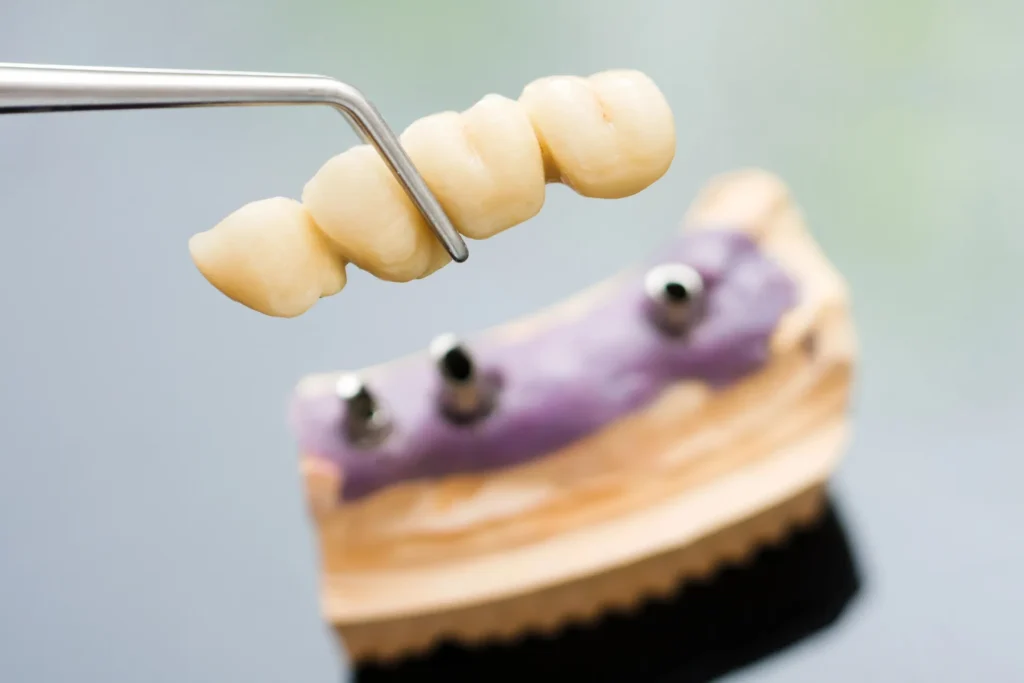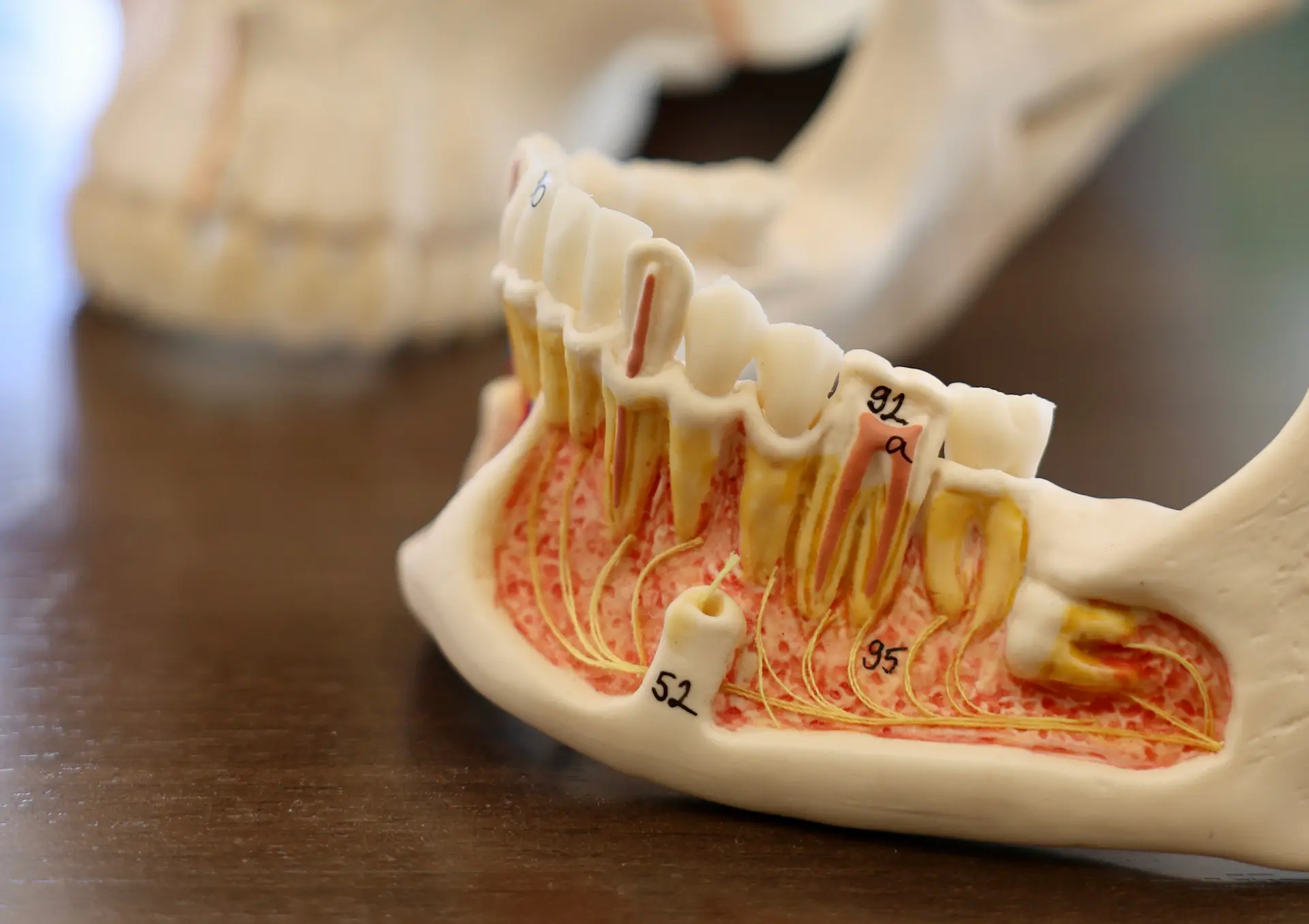Choosing between a root canal treatment and a dental implant can be a turning point for anyone dealing with tooth pain or decay. This choice affects not only your dental health but also significantly impacts your overall well-being and quality of life. Both treatments offer effective solutions but serve different needs and situations. Understanding the pros and cons of each option is vital to making an informed decision that aligns with your specific circumstances.
Are you interested in understanding whether a root canal or dental implant is better for you? Keep reading to explore and compare these two options.
Key Takeaways
- Root canals and implants have similar discomfort due to modern advancements in implant placement.
- Root canals save natural teeth but often require re-treatment due to a high failure rate whereas dental implants replace teeth with a long-lasting, natural-looking solution.
- Each option’s suitability depends on tooth condition, oral health, and bone density.
- Root canals are less expensive upfront but may end up being more expensive in the long run, while implants offer better long-term value.
- Having your cost-free consultation with us at NuSet Dental Implants ensures the best choice for your health, lifestyle, and budget.
What is a Root Canal?
A root canal is a dental treatment to save a tooth that is badly decayed or infected. Inside every tooth, under the white enamel and a hard layer called dentin, is a soft tissue known as the pulp.
The pulp contains blood vessels, nerves, and connective tissue, which help grow the root of your tooth during its development. However, when this pulp is damaged or infected due to deep decay, cracks, or chips in the tooth, it can lead to pain or even an abscess.
The root canal procedure involves removing the damaged or infected pulp, then cleaning and disinfecting the inside of the tooth, and finally, filling and sealing it to prevent further damage or infection. This process relieves tooth pain and also saves the tooth from needing to be removed.
Keeping your natural tooth helps maintain your chewing and biting efficiency and prevents other teeth from shifting, which could lead to jaw problems.
Benefits of a Root Canal
Root canal treatment offers several benefits, especially when it comes to saving a tooth that is in bad shape due to decay or infection. Here are the key advantages:
You get to keep your original tooth
One of the biggest drawcards for people choosing between a root canal and a dental implant is the chance they get to keep their original tooth. However, this is not always the case, as root canals often fail– resulting in more pain and discomfort. The tooth may also become discolored as a result of the root canal.
A root canal is more cost-effective for the short-term
Generally, a root canal is initially less expensive than getting a dental implant, making it a more accessible option for many people. However, root canals have a high failure rate, with many people spending additional money over the years to rectify the problem. This could make it less cost-effective in the long run since it is not a lifelong solution.
Getting a root canal is quick and less invasive
Root canals are relatively quick and require fewer visits to the dentist compared to dental implants. The procedure itself is straightforward and can often be completed in just one or two appointments. It’s also less invasive because it focuses on treating the inside of the tooth without the need for more complex surgery that dental implants may require.
Minimal discomfort
With advancements in dental techniques and anesthesia, both root canals and dental implants are much less painful than many expect, with both treatments having similar discomfort. Most patients experience minimal discomfort during and after the procedure.
Cons of a Root Canal
While root canal therapy is a highly effective treatment for saving a decayed or infected tooth, there are a few drawbacks to consider:
Not always possible
In some cases, a tooth may be too damaged or decayed for a root canal to be successful. If the tooth’s structure is compromised, it might not be possible to save it, and your dentist might recommend removal and replacement with a dental implant, which is a long-lasting solution to missing teeth.
Potential for re-treatment
Although root canal treatments have a high success rate, there’s a chance that the tooth could become re-infected. If this happens, the root canal procedure may need to be repeated, or the tooth might need to be extracted and replaced.
There may be a need for additional procedures
After a root canal, most teeth will require a crown to protect and strengthen the tooth structure. The added step of getting a crown means additional time and cost. While the crown helps restore the tooth to its full function, it also adds to the overall investment in the treatment.
Understanding these potential drawbacks is important as you consider your treatment options. When you book a no-cost consultation with us at Nuset, we evaluate your oral health and guide you on whether a root canal is the best choice.
What are Dental Implants?
Dental implants are a modern solution for replacing missing teeth. Unlike a root canal, which aims to save a decayed or infected tooth, dental implants replace a tooth that is already lost or too damaged to save. The process involves two main parts: the implant itself, which is a small titanium post inserted into the jawbone, and the crown, which is a custom-made tooth that is attached to the implant.
Here’s how dental implants work:
- The titanium post is surgically placed into the jawbone where the tooth is missing. Titanium is used because of its strong bond with bone, a process known as osseointegration. This foundation provides strong support for the new tooth, mimicking the root of a natural tooth.
- After the implant is placed, a period of healing is required, usually a few months, allowing the implant to bond securely with the jawbone. During this time, you will have a temporary tooth over the implant site.
- Once the implant has bonded with the jawbone, your new tooth, or crown, is made to match the color, shape, and size of your other teeth. This crown is then attached to the implant post.
- The result is a tooth that looks, feels, and functions just like a natural tooth. You care for it just as your other teeth and get to have your natural smile back.
Benefits of Dental Implants
Dental implants offer a range of benefits for individuals looking to replace missing teeth or those who are not candidates for root canal therapy. Here are some of the primary advantages:
Dental implants are a long-lasting solution to missing teeth
One of the most significant benefits of dental implants is their durability. With proper care, dental implants can last a lifetime. They are designed to fuse with your bone, becoming a permanent part of your jaw.
They look and feel like natural teeth
Dental implants are crafted to look, feel, and function like your natural teeth. They restore full chewing power, allowing you to eat your favorite foods without hesitation. Many people find that implants are indistinguishable from their natural teeth.
They prevent bone loss
Loss of teeth can lead to loss of bone mass in your jaw. Dental implants stimulate and preserve natural bone growth, preventing bone loss. This is important for maintaining the shape of your face and oral health.
Dental implants protect healthy teeth
Unlike a dental bridge, which may require cutting down adjacent teeth to anchor the replacement tooth, dental implants don’t compromise the health of your natural teeth. The implant stands independently, preserving the integrity of your surrounding teeth.
They help improve oral health
By filling the gap left by a missing tooth, dental implants prevent bacteria from accumulating in hard-to-reach places, reducing the risk of gum disease, which could affect other teeth.
Dental implants help to improve self-esteem
Missing teeth can affect your smile and lead to self-consciousness. Dental implants restore the appearance of your smile, boosting your confidence and self-esteem.
Getting dental implants involves several steps and a commitment to proper oral hygiene. However, for many, the result is a secure, long-term solution to tooth loss that enhances both oral health and quality of life.
Cons of Dental Implants
Although dental implants are a popular and effective solution for replacing missing teeth, there are some cons to consider before deciding if they are the right choice for you:
- Dental implants are generally more expensive than other treatment options.
- They require surgical procedures.
- Not everyone is a candidate for dental implants.
- Proper care and hygiene are critical to ensure the implant heals correctly and integrates with the jawbone.
How to Decide Which is Right for You
Choosing between a root canal and a dental implant is an important decision that depends on several factors specific to your dental health and personal preferences. Here are steps and considerations to help you make the right choice:
Assess the condition of your tooth
The decision often starts with the condition of your tooth. If your tooth’s structure is largely intact and the damage is primarily internal (to the pulp), a root canal may be able to save your tooth. A dental implant might be better if the tooth is missing or severely damaged or if a previous root canal has failed.
Consider your oral health and bone density
Dental implants require sufficient bone density to anchor the implant securely. If you’ve experienced significant bone loss, additional procedures like bone grafting might be necessary, affecting your decision. Your overall oral health, including gum health, also plays a critical role in determining the most suitable treatment.
Evaluate costs and insurance coverage
Root canals are generally less expensive and are often covered by dental insurance, while dental implants can be more costly and are less likely to be covered. Consider your financial situation and check with your insurance provider to understand what is covered under your plan.
Think about the long-term
Consider how each option fits into your long-term dental health plan. While dental implants may have a higher upfront cost and longer treatment time, they last longer and can be a good investment in your oral health. Root canals can save your natural tooth and are less invasive, but there is a higher risk of failure.
Consult with dental professionals
Ultimately, consulting with a dentist is crucial. They can provide a detailed assessment of your situation, explain the risks and benefits of each option, and recommend the best course of action based on your specific needs.
Reflect on your personal preferences
Finally, consider your personal preferences and lifestyle. Some people prioritize keeping their natural teeth whenever possible, while others may prefer the durability and longevity of a dental implant.
Considering these factors and discussing them with your dental care provider will help you make an informed decision that best suits your health, lifestyle, and budget.

Let Us Help You Make the Best Decision For Your Oral Health
Choosing between a root canal and a dental implant is a significant decision that impacts your dental health and overall quality of life. While both options offer effective solutions for treating and replacing damaged or decayed teeth, and the best choice depends on various factors, including the condition of your tooth, your overall oral health, financial considerations, and personal preferences.
Book a no-cost consultation with us at Nuset Dental Implants and Oral Surgery. During your first visit, we will thoroughly discuss your specific situation, assess it, and help guide you toward the decision that best meets your needs. Schedule a consultation with us today to get started!
Frequently Asked Questions
Is it better to get an implant or a root canal?
The decision between getting an implant or a root canal depends on the condition of the tooth and personal circumstances. A root canal is preferred if the goal is to save the natural tooth and it is deemed viable by a dentist. An implant is considered when the tooth is missing or too damaged for a root canal to be effective.
Is it better to pull a tooth or get a root canal?
Pulling a tooth (extraction) is generally considered a last resort when a root canal is not feasible or has failed to save the tooth. A root canal is often the preferred choice because it allows you to keep your natural tooth, maintaining its function and appearance.
Which is better, a crown or an implant?
The choice between a crown and an implant depends on the tooth’s condition and what it needs. A crown covers and protects a damaged tooth, often after a root canal, whereas an implant replaces a missing tooth entirely. If the tooth’s structure is intact, a crown may be sufficient. If the tooth is missing, an implant will be necessary.





